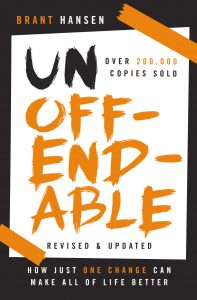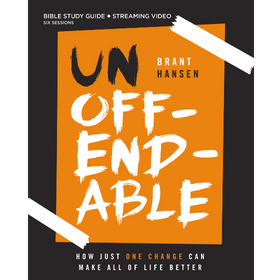By Brant Hansen
Why isn’t righteous anger ever listed among the things that a Spirit-filled life will bring us? If it’s righteous, why is it not akin to the “fruit of the Spirit,” like love, joy, peace, and gentleness? Why is anger in Scripture so consistently lumped in the other lists with things like, say, slander and malice, with no exclusions for the “righteous” variety? (See, for example, Colossians 3:8).
righteous, why is it not akin to the “fruit of the Spirit,” like love, joy, peace, and gentleness? Why is anger in Scripture so consistently lumped in the other lists with things like, say, slander and malice, with no exclusions for the “righteous” variety? (See, for example, Colossians 3:8).
We aren’t to just pretend anger away or feel guilty for the initial emotion of anger. But we are to deal with it, with the goal of eradicating it within us. This, of course, is not easy to do, but it’s not complex to understand, either.
Few ever present the radical implications of what it means to die to ourselves and what it means to practice a lifestyle of forgiveness. “Stepping out of anger,” Dallas Willard says, “means you are surrendering your will to God. It means you have accepted that you don’t have to have your way.”[1] When I’ve read commentaries on Ephesians 4:31, where Paul says to get rid of bitterness, anger, evil speaking, and so on, the commenter very often inserts the word unreasonable before anger. But that’s not in the text, and the commenter doesn’t extend the “unreasonable” standard to anything else on the list. (What about “unreasonable bitterness”?)
We take something like “Love your enemies” and “Pray for those who persecute you,” and tack on “But, really, holding on to anger is justified.” We do this with the apostle James, who, in the Bible, said point-blank that anger does not produce the kind of righteousness God wants in us: “The anger of man does not produce the righteousness of God” (James 1:20 ESV).
“But didn’t some biblical heroes act out of anger?” Well, sure they did. They were humans. I’m so thankful the Bible is not a just-so story, not a singsongy, children’s pop-up book of SuperClean Heroes. Its stories are of people, like us moderns, who lie and cheat and steal and harbor anger and occasionally even kill innocent people. It’s a mess. To say, “Well, Moses got angry at injustice in Exodus 2” is not to say that we should kill Egyptians too. Those stories aren’t how-to templates for our lives; they’re stories that point us, ultimately, to the goodness of God.
How does the Bible Deal with Anger?
Feeling powerless is sometimes excruciating. We want justice, and we want it now. If we can’t get it, we can at least harbor our self-righteous anger and righteous indignation. Sometimes, it’s all we think we can do.
The Bible tells us to do something truly revolutionary, certainly un-American, and completely at odds with that: wait.
- Wait on the Lord; be of good courage, and He shall strengthen your heart; wait, I say, on the Lord! (Psalm 27:14 NKJV)
- For evildoers shall be cut off; but those who wait on the Lord, they shall inherit the earth. (Psalm 37:9 NKJV)
- Wait on the Lord, and keep His way, and He shall exalt you to inherit the land; when the wicked are cut off, you shall see it. (Psalm 37:34 NKJV)
- Do not say, “I will recompense evil”; wait for the Lord, and He will save you. (Proverbs 20:22 NKJV)
This is really, really, really, really, really hard. I know; I just wrote really five times, and that’s pretty unprofessional, but I could’ve written a lot more. I know it’s hard, because it’s hard for me right now, and yet, there it is. Wait!
And if I’m overemphasizing by writing really a lot, the writers of the Bible emphasize wait far more. I picked just a few verses of dozens. Waiting is not a subtle theme of Scripture.
And yes, we’re also told to be just and to love mercy, in the meantime: “The Lord has told you, human, what is good; he has told you what he wants from you: to do what is right to other people, love being kind to others, and live humbly, obeying your God” (Micah 6:8 NCV).
Living “humbly” is the part I’m so often missing in my anger. I want comeuppance for the proud, and I want it now. I don’t want to wait.
In fact, I don’t fully trust God. I’m worried He won’t handle things the way I’d like.
Worry and anger often go hand in hand. They’re both about feeling threatened, and they both represent, ultimately, a lack of trust. But there’s a flipside, and it’s good news: we get to see all over again how freeing it really is to trust God.
My anger isn’t a sign of trust; it’s the very opposite. I’m worried someone’s going to get away with something, like God’s not noticing and it’s all up to me. This kind of anger is perfectly human, of course, and perfectly natural, and just as perfectly destructive as any other kind of anger.
Rest in the Lord, and wait patiently for Him; do not fret because of him who prospers in his way, because of the man who brings wicked schemes to pass. Cease from anger, and forsake wrath; do not fret—it only causes harm. (Psalm 37:7–8 NKJV)
So let’s joyfully work for justice and mercy. And while we do it, let’s trust that God, our Father, who actually loves us, and also loves mercy and justice more than we ever could, is ultimately going to set things right (Romans 12). We don’t need to act like kids who’ve been abandoned and are forced to take matters into our own hands, defending ourselves at every turn. Our Father is coming home, and He tells us, over and over, He’s going to take care of things.
Choosing to be unoffendable, or relinquishing my right to anger, does not mean accepting injustice. It means actively seeking justice, and loving mercy, while walking humbly with God.
And that means remembering I’m not Him.
What a relief.
_________
 Adapted from Unoffendable: How Just One Change Can Make All of Life Better by Brant Hansen. Click here to learn more about this book, and click here to learn more about the video Bible study.
Adapted from Unoffendable: How Just One Change Can Make All of Life Better by Brant Hansen. Click here to learn more about this book, and click here to learn more about the video Bible study.
It turns out giving up your “right” to be offended can be one of the most freeing, healthy, simplifying, relaxing, refreshing, stress-relieving, encouraging things you can do. It’s a radical, provocative idea: We’re not entitled to get offended or stay angry. The idea of our own “righteous anger” is a myth. It is the number one problem in our societies today and, as Dallas Willard says, Christians have not been taught out of it. But what if Christians were the most unoffendable people on the planet?
In Unoffendable you will find concrete, practical ways to live life with less stress, including:
- Adjusting your expectations to fit human nature
- Replacing perpetual anger with refreshing humility and gratitude
- Embracing forgiveness and beginning to love others in unexpected ways
Newly revised with two brand-new chapters on forgiveness and what Hansen has learned since writing his original book, this updated edition of the bestselling book is a must-read for every Christian. In a humorous and conversational style, Unoffendable seeks to lift religious burdens from our backs and allow us to experience the joy of gratitude, perhaps for the first time, every single day of our lives—flourishing the way God intended.
 Brant Hansen is a syndicated radio host, and one of the most listened-to in the country. He also hosts a popular podcast (“The Brant and Sherri Oddcast”) and works extensively as an advocate of CURE International, a global network of hospitals and programs for children with correctable disabilities. In addition to his books, Unoffendable, Blessed Are the Misfits, The Truth About Us, and The Men We Need, Brant has written for the Washington Post, USNews.com, CNN.com, InTouch, and Relevant. Brant is married to Carolyn, and they have two adult children.
Brant Hansen is a syndicated radio host, and one of the most listened-to in the country. He also hosts a popular podcast (“The Brant and Sherri Oddcast”) and works extensively as an advocate of CURE International, a global network of hospitals and programs for children with correctable disabilities. In addition to his books, Unoffendable, Blessed Are the Misfits, The Truth About Us, and The Men We Need, Brant has written for the Washington Post, USNews.com, CNN.com, InTouch, and Relevant. Brant is married to Carolyn, and they have two adult children.
[1] Dallas Willard, “Divine Conspiracy 11: Living Without Anger,” 1:20:59, lecture recorded during the Harvey Fellows 2007 Summer Institute, posted by “Daniel dliver,” June 22, 2011, www.youtube.com/watch?v=NBBB9G6WW3w.

